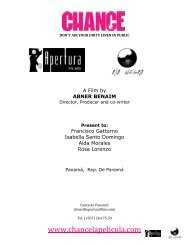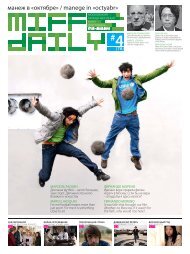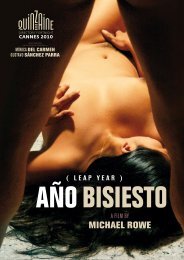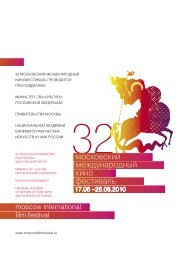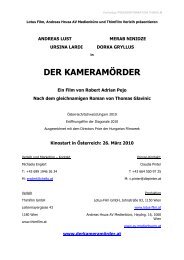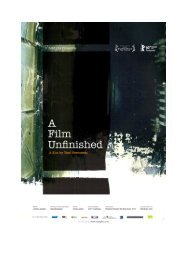Немецкое киНо. от десятилетия к десятилетию 10 DecaDes of ...
Немецкое киНо. от десятилетия к десятилетию 10 DecaDes of ...
Немецкое киНо. от десятилетия к десятилетию 10 DecaDes of ...
You also want an ePaper? Increase the reach of your titles
YUMPU automatically turns print PDFs into web optimized ePapers that Google loves.
КИНО ГДР В 60-Е: ОПРАВДАНИЕ СМЫСЛА.«Рас<strong>к</strong>ол<strong>от</strong>ое небо» Конрада ВольфаThe Cinema <strong>of</strong> the GDR in the 60's: Justification <strong>of</strong> Meaning.Konrad Wolf’s «The Divided Heaven»Ви<strong>к</strong>тория Белопольс<strong>к</strong>ая /Victoria BelopolskayaОтечественный <strong>к</strong>ино<strong>к</strong>рити<strong>к</strong>. О<strong>к</strong>ончила фа<strong>к</strong>ультет журналисти<strong>к</strong>иМГУ. Раб<strong>от</strong>ала <strong>к</strong>орреспондентом журнала «Огоне<strong>к</strong>»,газеты «КоммерсантЪ-daily», реда<strong>к</strong>тором российс<strong>к</strong>оговыпус<strong>к</strong>а журнала Premiere. Вела авторс<strong>к</strong>ую <strong>к</strong>олон<strong>к</strong>у о <strong>к</strong>инов журнале Cosmopolitan. Ныне – <strong>к</strong>инообозреватель журнала«Психология»/Psychologies. Составитель программ неигрового<strong>к</strong>ино для <strong>от</strong>ечественных и международных фестивалей.С<strong>от</strong>рудни<strong>к</strong>-<strong>к</strong>онсультант Международного фестиваля до<strong>к</strong>ументального<strong>к</strong>ино в Амстердаме. Программный дире<strong>к</strong>торфестиваля до<strong>к</strong>ументального арт<strong>к</strong>ино «Артдо<strong>к</strong>фест».Russian film critic. Graduated from the department <strong>of</strong> Journalismat MGU. Worked as a correspondent for the magazine «Ogonyok»,the newspaper «Kommersant Daily», was an editor <strong>of</strong> theRussian edition <strong>of</strong> «Premiere» magazine. Was a columnist for«Cosmopolitan». At present is a film reviewer for the magazine«Psychologies». Compiled programs <strong>of</strong> non-live-action films fornational and international festivals. A consultant-collaborator atthe International festival <strong>of</strong> documentary films in Amsterdam.Program director <strong>of</strong> the festival <strong>of</strong> documentary art films«Artdocfest».«Уже» – узловое понятие для <strong>к</strong>ино ГДР в 60-е. Ужепережита <strong>к</strong>атастрофа фашизма и войны. Ужесовершено непоправимое. Уже очевидна вина.Германий уже две. Уже почти за<strong>к</strong>рыта граница междуними. Уже миром признана ГДР. Уже начато социалистичес<strong>к</strong>оестроительство. Правительство ФРГ уже приняло <strong>к</strong>реализации «до<strong>к</strong>трину Хальштейна», предусматривавшуюразрыв дипломатичес<strong>к</strong>их <strong>от</strong>ношений с любой страной,признавшей ГДР. И уже почти построена Стена. И уже «написанВертер» – свои фильмы уже сняли Пабст и Вине, атеперь <strong>к</strong>ино Европы уже на<strong>к</strong>рыто «новой волной».Кинематограф Германии социалистичес<strong>к</strong>ой существует вобстоятельствах свершившейся истории. Истории, за<strong>к</strong>онсервированнойза Стеной, остановленной Стеной. И <strong>к</strong>иноГДР осмысливает новые обстоятельства – обстоятельствасуществования «после».В этом существовании, <strong>к</strong>азалось бы, есть высший смысл.Казалось бы, немец<strong>к</strong>ий народ, на<strong>к</strong>онец, нашел смыслбытия – он строит будущее, где не будет боли. Но лучшиефильмы 60-х – «Рас<strong>к</strong>ол<strong>от</strong>ое небо» Конрада Вольфа, «След<strong>к</strong>амней» Фран<strong>к</strong>а Байера, «Хрони<strong>к</strong>а одного лета» РальфаКирстена – будто стараются оправдать найденный смысл.Будто им мало вели<strong>к</strong>ой строй<strong>к</strong>и социализма…В этих <strong>к</strong>артинах ау<strong>к</strong>ается стыдное прошлое, в них болятнесправедливости и неустроенность настоящего, они нечужды идеологичес<strong>к</strong>им диспутам. Но они совершеннонеожиданным образом тол<strong>к</strong>уют социалистичес<strong>к</strong>ое строительство.Социализм тут не социальное равенство и невсеобщая сытость, а общая одух<strong>от</strong>воренность. Не обществосправедливости, а общество сильных чувств и честных<strong>от</strong>ношений. Та<strong>к</strong>, Рите из «Рас<strong>к</strong>ол<strong>от</strong>ого неба» не понравитсяв ФРГ, <strong>к</strong>уда уехал ее возлюбленный: «И о чем в этом городедумают перед сном?» – та<strong>к</strong>, вернувшись, она с<strong>к</strong>ажет опуст<strong>от</strong>е жизни в Западной Германии.Это она вышла на первый план в восточнонемец<strong>к</strong>ом <strong>к</strong>ино60-х <strong>к</strong>а<strong>к</strong> главное действующее лицо <strong>десятилетия</strong> будто изнедр национального <strong>к</strong>олле<strong>к</strong>тивного бессознательного –женщина. На ней меньше историчес<strong>к</strong>ой вины, чем, понятноедело, на мужчинах. Она не та<strong>к</strong> опустошена драмаминемец<strong>к</strong>ой истории. Она сохранила способность <strong>к</strong> живомучувству, ее интуицию не притупил горь<strong>к</strong>ий и страшныйфронтовой опыт, она распознает фальшь и уж больше недаст себя обмануть. Кино ФРГ понадобится еще полтора<strong>десятилетия</strong>, чтобы понять, что это она, женщина с типичнейшимдля этих мест именем Мария Браун – главноелицо немец<strong>к</strong>ой послевоенной истории. А в <strong>к</strong>ино ГДР уже с61-го действуют женщины с сильными чувствами и сильнойвитальностью – Рита из «Рас<strong>к</strong>ол<strong>от</strong>ого неба», Грит из«Хрони<strong>к</strong>и одного лета». Они несут в себе будущую жизньпросто в силу женс<strong>к</strong>ого дара воспроизводить жизнь. Ипоэтому та<strong>к</strong> органично вписаны в натуру <strong>к</strong>ино ГДР 60-х –стройплощад<strong>к</strong>и, заводы, где строится, <strong>к</strong>уется, собираетсято, чему еще толь<strong>к</strong>о предстоит быть.И это им та<strong>к</strong> <strong>к</strong> лицу драматургичное, живое <strong>к</strong>инематографичес<strong>к</strong>оеосвещение, пришедшее в <strong>к</strong>ино ВосточнойГермании то ли из фильмов «нувель ваг», то ли из атмосферымирового <strong>к</strong>инообновления вообще. Но та<strong>к</strong> илииначе живая натура и живой свет – тоже «действующиелица» <strong>к</strong>ино ГДР 60-х. Жизнь вошла в их <strong>к</strong>адр. И <strong>от</strong>менилаабсолюты – Стены, трагичес<strong>к</strong>ого прошлого, невнятногонастоящего. И даже светлого будущего.«Already» is the key concept for the cinema <strong>of</strong> theGDR <strong>of</strong> the 1960s. The catastrophe <strong>of</strong> fascismand war was already in the past. The damagehad been done. The guilt was already obvious. There werealready two Germanies. The border had already been almostsealed. The GDR had already been recognized worldwide.Socialist construction had already begun. The Government <strong>of</strong>the FRG had accepted «Hallstein-Doktrin» which stated thatthe country would break diplomatic relations with any statewhich acknowledged the GDR. The Wall had already beenalmost completed. And «Werther had been written»: Pabst andWiene had shot their films and the New Wave had swept overEuropean cinema.The cinema <strong>of</strong> socialist Germany existed in the reality <strong>of</strong> acertain historical situation. History was canned by the Wall,was stopped by the Wall. The cinema <strong>of</strong> the GDR tried to cometo terms with the new reality, the reality <strong>of</strong> «after».This reality seemed to have a sublime meaning. The Germanpeople seemed to have found the meaning <strong>of</strong> life, theywere building a future were there would be no pain. Butthe best films <strong>of</strong> the 60s «The Divided Heaven» by KonradWolf, «The Trace <strong>of</strong> Stones» by Frank Beyer, «Beschreibungeines Sommers» by Ralf Kirsten seemed to be justifyingthe discovered meaning. As though the great socialistconstruction were not enough…These films echo the shameful past, they resonate with theinjustice and incoherence <strong>of</strong> the present, they are not immuneto ideological arguments. And they <strong>of</strong>fer a very unexpectedunderstanding <strong>of</strong> socialist construction. Socialism does notmean social equality and universal satiety, but universalspirituality. It is not a society <strong>of</strong> justice, but a society <strong>of</strong> strongemotions and fair relations. Thus Rita from «The DividedHeaven» does not like it in the FRG where her beloved hasmoved. «What do they think about before going to sleep in thattown?» That is how she characterizes the emptiness <strong>of</strong> life inWest Germany on her return home.In the 60s the woman emerged as the main character <strong>of</strong>East German cinema as though appearing from collectivesubconsciousness. Evidently she bore less historical guilt thanman. She was not as devastated by the dramas <strong>of</strong> Germanhistory. She had preserved the ability to feel, her intuition wasnot numbed by the bitter and horrible experience at the front,she sensed falsehood and would not be tricked again. Thecinema <strong>of</strong> the FRG would need another decade and a half torealize that it was her, the woman with a typical local nameMaria Brown that was the principal character in the post-warhistory. The cinema <strong>of</strong> the GDR had been showing women withstrong feelings and strong vitality since 1961. They were Ritafrom «The Divided Heaven», Grit from «Chronicle <strong>of</strong> a SumBeschreibung eines Sommers mer». They were the bearers <strong>of</strong>a new life simply by virtue <strong>of</strong> the female ability to reproducelife. That is why construction sites, where future objects arebuilt, forged, assembled, formed such a natural part <strong>of</strong> thecinema <strong>of</strong> the GDR in the 60s.The dramatic vibrant lighting which was brought to the EastGermany by the «New Wave» or by the overall cinematicrenewal is so becoming to these films. But one way or theother real nature and natural lighting are also «characters»<strong>of</strong> the East-German cinema <strong>of</strong> the 60s. Life has entered theframe. And abolished the absolutes – the Wall, the tragic past,the incoherent present. And even the bright future.38 39



